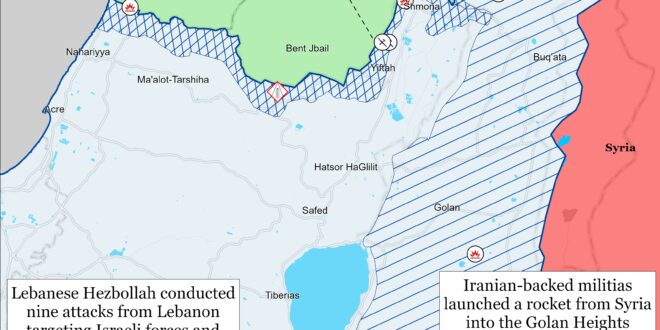IRGC Navy Commander Rear Adm. Ali Reza Tangsiri implicitly threatened the United Arab Emirates (UAE) during an interview with Lebanese Hezbollah-controlled media on April 9, likely to pressure the UAE to sever ties with Israel.[i] Tangsiri issued a series of threatening messages, all of which appear aimed at the UAE, during the interview. Tangsiri reiterated the long-standing Iranian threat to close the Strait of Hormuz and furthermore suggested that Israel is cooperating with the UAE against Iran. Tangsiri claimed that Israel is present in the UAE under the pretext of “economic work” but actually engages in security and military activities there that threaten Iran.[ii] Tangsiri’s decision to conduct the interview with an Arabic-language outlet further suggests that he intended to message to an Arabic-speaking audience.
Tangsiri’s comments are part of a larger Iranian effort to impose an unofficial blockade on Israel. Supreme Leader Ali Khamenei has urged regional states to cut trade ties with Israel and institute a blockade in response to the Israel-Hamas war. The Houthis have conducted over 40 attacks targeting commercial vessels in the Red Sea since November 2023, as part of this Iranian-led call effort, causing maritime traffic through the Red Sea to decline by approximately 50 percent since January 2024.[iii] Israel has increasingly relied on overland trade with the Gulf States in recent months to compensate for reduced trade activity at the Port of Eilat due to the Houthis’ anti-shipping campaign.[iv] Tehran and its regional allies have focused in more recent weeks on disrupting the Israeli ground connection to the Arabian Peninsula. Iranian state media and Iranian-backed Iraqi militias recently criticized the UAE for allowing Israel to conduct trade through its territory.[v] Iranian-backed Iraqi militias have, moreover, called for the dismantlement of Israel’s “land bridge” through Jordan, as CTP-ISW previously noted.[vi]
Tangsiri separately endorsed the strategy of “strategic patience” in response to the April 1 Israeli airstrike that killed seven IRGC officials in Damascus. “Strategic patience” is a long-standing Iranian regime policy that involves not immediately conducting a major response to Israeli attacks. Tangsiri claimed that Iran will “strike [Israel] hard at the right time,” but emphasized that Iran will not act “emotionally” or “hastily.”[vii] Tangsiri added that “it is not the case that [Iran] will not give a response.”[viii] Numerous senior Iranian military officials, including Armed Forces General Staff Chief Maj. Gen. Mohammad Bagheri and Supreme Leader Military Affairs Adviser Maj. Gen. Yahya Rahim Safavi, have similarly stated in recent days that Iran will respond to the April 1 airstrike “at the right time.”[ix]
US, Israeli, and Iranian officials told the New York Times that Iran is operating a smuggling network through Jordan to arm Palestinian fighters in the West Bank.[x] The Iranian officials described this effort as meant to ”foment unrest against Israel.” They added that Tehran is not trying to arm any particular Palestinian militias and is using Bedouin smuggling networks in Jordan and Iranian-backed militias in Syria to facilitate the transfer of materiel into the West Bank. US and Israeli officials said that the Iranian-backed networks are specifically involved in moving small arms, anti-tank missiles, and rocket-propelled grenades. Iran’s smuggling network in Jordan could enable already motivated militias in the West Bank to attack Israeli targets.
The Iranian effort to build its capabilities and networks in the West Bank is part of a larger effort to encircle Israel militarily. IRGC Commander Maj. Gen. Hossein Salami presented in August 2022 the clearest articulation yet from an Iranian official on how they plan to destroy Israel, and he placed special emphasis on growing anti-Israel militancy around the West Bank.[xi] Afshon Ostovar, a well-known analyst on Iran, suggested to the New York Times that Iran may be focusing on arming the West Bank because it anticipates having more limited access to militias in the Gaza Strip in the future.[xii] Tehran has sought to develop the capabilities and infrastructure of its militia network in the West Bank in recent years, but the Israel-Hamas war has highlighted the shortcomings of its networks there.[xiii]
Key Takeaways:
Iran: IRGC Navy Commander Rear Adm. Ali Reza Tangsiri implicitly threatened the United Arab Emirates (UAE) during an interview with Lebanese Hezbollah-controlled media, likely to pressure the UAE to sever ties with Israel.
Tangsiri separately endorsed the strategy of “strategic patience” in response to the April 1 Israeli airstrike that killed seven IRGC officials in Damascus.
West Bank: US, Israeli, and Iranian officials told the New York Times that Iran is operating a smuggling network through Jordan to arm Palestinian fighters in the West Bank.
The Iranian effort to build its capabilities and networks in the West Bank is part of a larger effort to encircle Israel militarily.
Northern Gaza Strip: Palestinian militias conducted several indirect fire attacks targeting Israeli forces in the northern Gaza Strip.
Central Gaza Strip: The IDF Air Force killed the Maghazi mayor, whom Israel says was a member in Hamas’ military wing in the central Gaza Strip.
Political Negotiations: Hamas said on April 8 that the latest Israeli ceasefire proposal does not meet its demands.
Southern Lebanon and Golan Heights: Lebanese Hezbollah has conducted at least nine attacks from southern Lebanon into northern Israel.
Syria: The IDF and local Syrian sources reported that unspecified Iranian-backed militants launched a rocket from Syria targeting the Yonatan region of the Golan Heights.
Iraq: The Islamic Resistance in Iraq—a coalition of Iranian-backed Iraqi militias—claimed that it conducted five attacks into Israel using “appropriate weapons” over the previous 72 hours.
Iran: Jaish al Adl—a Baloch, Salafi-jihadi militia group—conducted an attack killing at least five Iranian Law Enforcement Command (LEC) officers in Sib and Soran county, Sistan and Baluchistan Province.
Yemen: US CENTCOM reported that it targeted Houthi air defense systems in Houthi-controlled Yemen. CENTCOM separately intercepted a Houthi drone over the Red Sea.
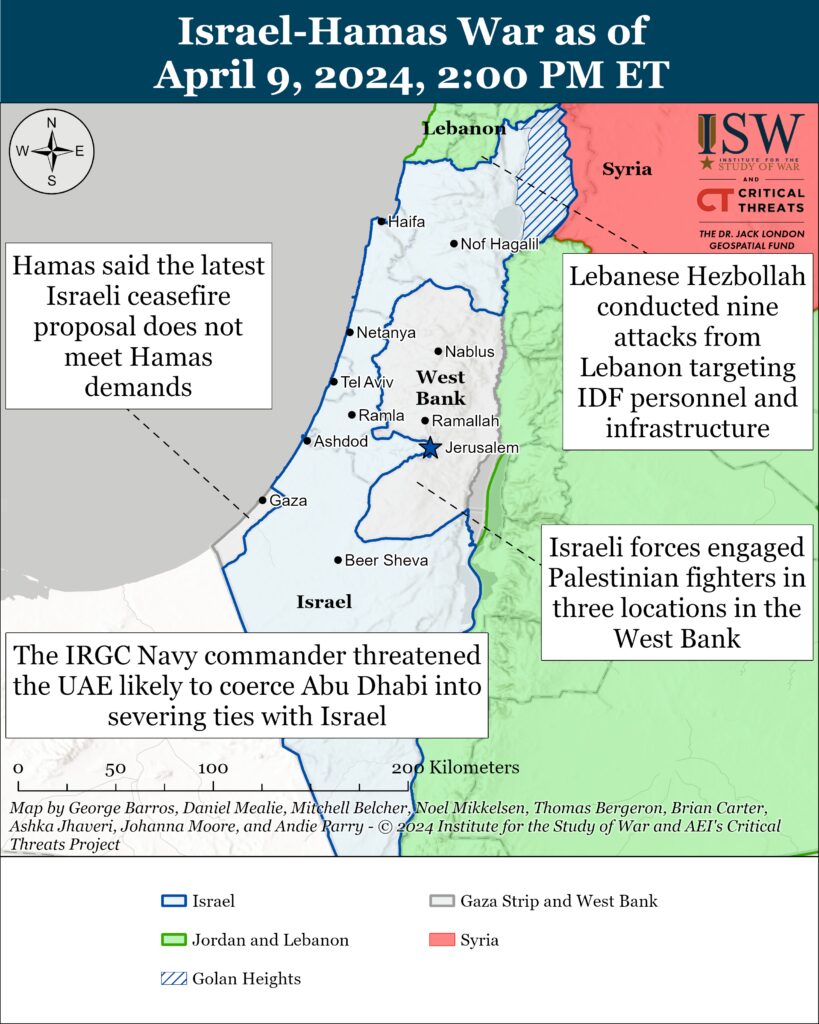
Gaza Strip
Axis of Resistance objectives:
Erode the will of the Israeli political establishment and public to sustain clearing operations in the Gaza Strip
Reestablish Hamas as the governing authority in the Gaza Strip
Palestinian militias conducted several indirect fire attacks targeting Israeli forces in the northern Gaza Strip on April 9. Palestinian Islamic Jihad (PIJ) claimed that it mortared an Israeli command site southwest of Gaza City.[xiv] Hamas separately claimed that it mortared Israeli forces near Shujaiya neighborhood in eastern Gaza City as well as an Israeli command site near where the IDF is constructing a highway in southern Gaza City.[xv]
The Israel Defense Forces (IDF) Nahal Brigade (162nd Division) continued to conduct clearing operations in the central Gaza Strip on April 9. The Nahal Brigade killed and directed an airstrike targeting several Palestinian fighters.[xvi] The Nahal Brigade is operating around the border of the central and northern strip to secure the Israeli highway and bases nearby.
The IDF Air Force conducted several airstrikes targeting Palestinian military infrastructure in the Gaza Strip on April 9.[xvii] The IDF destroyed the site from which PIJ launched rockets into southern Israel on April 8.[xviii] The IDF separately conducted an airstrike in Khan Younis, killing a Palestinian fighter, who was involved in the October 7 attack.[xix]
The IDF Air Force killed the Maghazi mayor, whom Israel says was a member in Hamas’ military wing in the central Gaza Strip on April 8.[xx] The IDF said that the mayor, Hatem Saleh al Ghamri, was part of Hamas’ Emergency Committees, which is responsible for maintaining public order and civil control.[xxi] Ghamri was also reportedly a fighter in Hamas’ Maghazi Battalion.[xxii] CNN reported that Hamas condemned the strike and said that Ghamri was the mayor of the Maghazi refugee camp.[xxiii] The IDF previously killed five members of Hamas’ Emergency Committees in Rafah in March 2024.[xxiv]
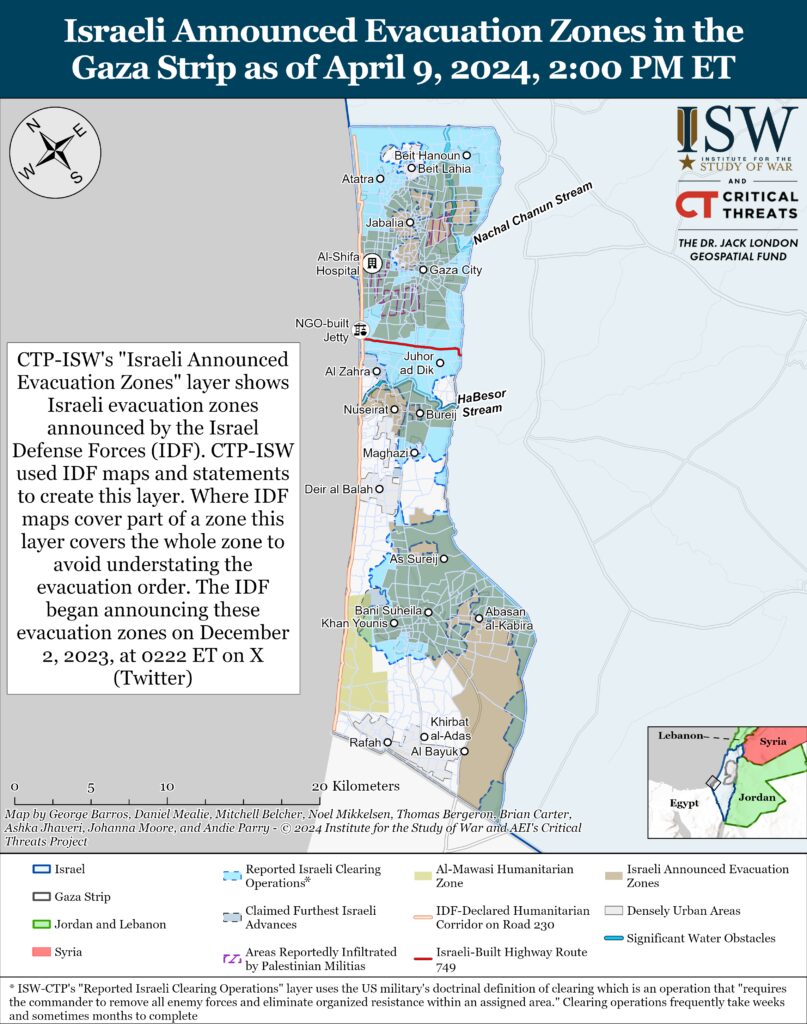
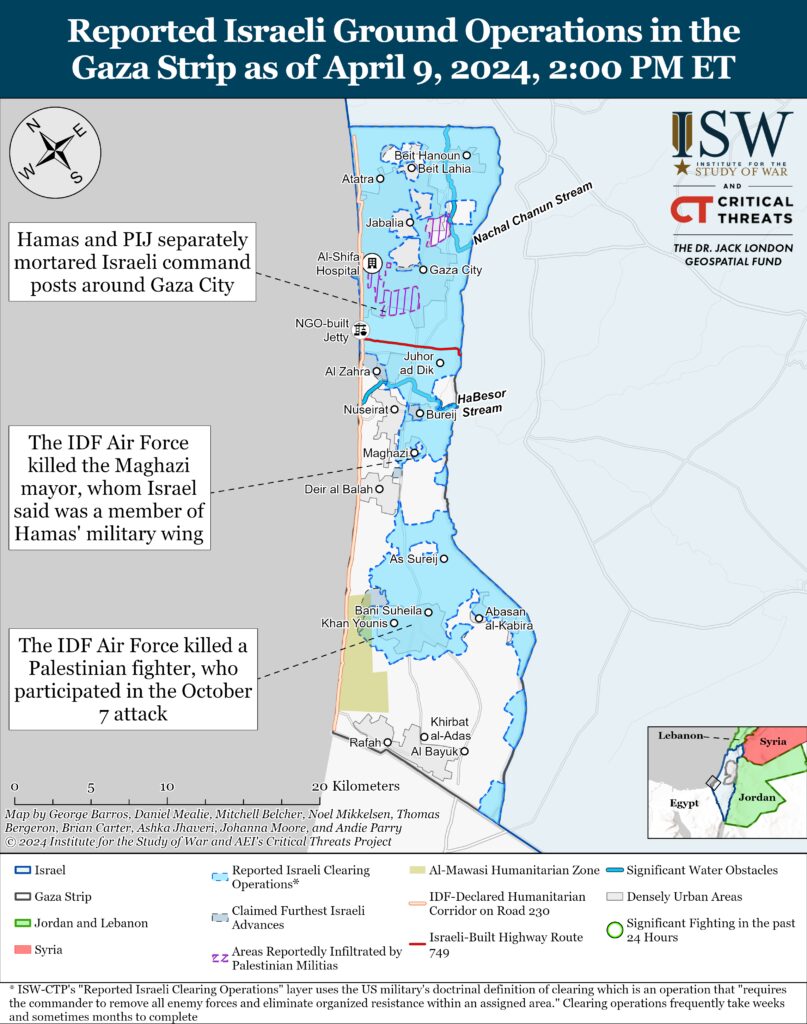
Israeli media close to the IDF reported on April 9 that the Israeli forces withdrawn from Khan Younis will prepare for fighting in other areas and carry out large, unspecified humanitarian operations.[xxv] The IDF withdrew most of its forces from the Gaza Strip on April 7, including the IDF 98th Division, which had been operating around Khan Younis for four months.[xxvi] The report noted that Israeli forces are preparing for fighting in Rafah, among other unspecified places.[xxvii]
Israeli Defense Minister Yoav Gallant told US Secretary of Defense Lloyd Austin on April 8 that Israel has not yet set a date for a clearing operation into Rafah, according to an unidentified source with direct knowledge.[xxviii] Gallant’s comments follow Israeli Prime Minister Benjamin Netanyahu saying that Israel has set a date for the offensive.[xxix] US Secretary of State Antony Blinken said that Israel has not informed the United States on the date of the operation.[xxx]
Hamas said on April 8 that the latest Israeli ceasefire proposal does not meet its demands.[xxxi] The group is currently reviewing the proposal and will soon inform international mediators of its response. The Wall Street Journal, citing officials’ part of the negotiations, reported that Israel and Hamas still disagree over key aspects of a deal, including the return of displaced Palestinians to the northern Gaza Strip, the identities of Palestinian prisoners set to be released under the deal, and the future of Israeli military operations in the strip.[xxxii] The officials noted that Hamas has demanded the free movement of displaced Palestinians to the north, while Israel has rejected the unconditional return of Palestinians there. Unspecified Egyptian officials reported that Israel wants to inspect Palestinians moving from the south to the north to stop potential Hamas fighters from returning alongside civilians.[xxxiii] CTP-ISW previously reported how Hamas could use the return of civilians to the north to bring its own fighters back to the area amid Hamas attempts to reassert its authority there.[xxxiv]
Israel reported that it has increased the amount of aid moving into the Gaza Strip.[xxxv] The Coordinator of Government Activities in the Territories (COGAT)—a department within the Israeli Defense Ministry—announced that Israel has expanded the scope of aid and doubled the daily number of civilian trucks that can move through the Kerem Shalom crossing.[xxxvi] COGAT claimed that UN aid agencies are not using the full capacity of the Kerem Shalom route.[xxxvii] Israel said 468 trucks entered the Gaza Strip on April 9, which is the highest rate since the war began.[xxxviii] The United Nations reports much lower numbers, noting that many trucks are only half full because of Israeli inspection rules.[xxxix] US State Departments spokesperson Matthew Miller said on April 8 that the high number of trucks entering the Gaza Strip “represents a significant improvement, but it is important not just that we see the daily number continue to grow, but that it be sustained over time.”[xl]
Palestinian fighters did not conduct any indirect fire attacks from the Gaza Strip into Israel on April 9.
West Bank
Axis of Resistance objectives:
Establish the West Bank as a viable front against Israel
Israeli forces have engaged Palestinian fighters in at least three locations in the West Bank since CTP-ISW’s last data cut off on April 8.[xli] Israeli forces detained nine wanted Palestinians, including one Hamas member, in the West Bank during the operations there.[xlii] The al Aqsa Martyrs’ Brigade fired small arms and detonated improvised explosive devices in two separate attacks targeting Israeli forces around Nablus and Tulkarm.[xliii] Israeli forces separately engaged Palestinian fighters in Jayyus, east of Qalqilya.[xliv]
A PIJ cell in Jenin claimed a shooting attack on April 9 targeting Gan Ner, which is in northern Israel near the border with the West Bank.[xlv]
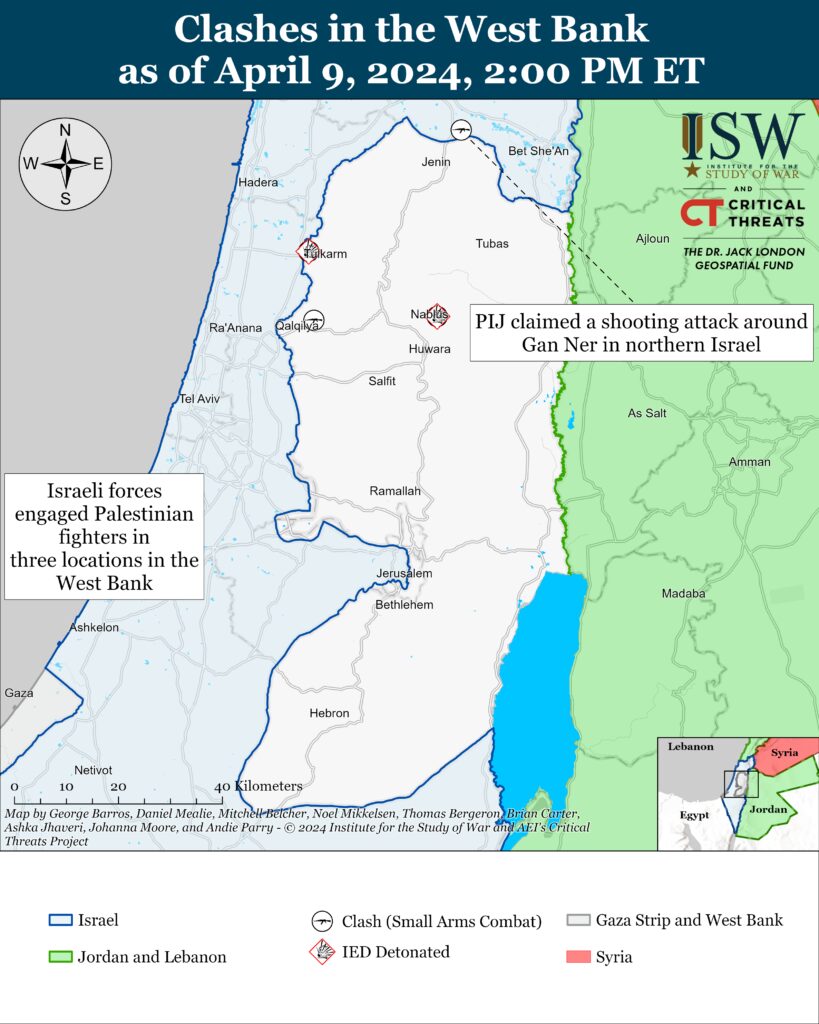
This map is not an exhaustive depiction of clashes and demonstrations in the West Bank.
Southern Lebanon and Golan Heights
Axis of Resistance objectives:
Deter Israel from conducting a ground operation into Lebanon
Prepare for an expanded and protracted conflict with Israel in the near term
Expel the United States from Syria
Lebanese Hezbollah has conducted at least nine attacks from southern Lebanon into northern Israel since CTP-ISW’s last data cutoff on April 8.[xlvi] Hezbollah fighters launched a one-way attack drone targeting an Israeli counter-drone electronic jamming device south of Kiryat Shmona.[xlvii]
The IDF and local Syrian sources reported that unspecified Iranian-backed militants launched a rocket from Syria targeting the Yonatan region of the Golan Heights on April 8.[xlviii] Israeli forces targeted the launch site in Daraa Province with artillery fire.[xlix] The IDF also said that it conducted strikes on Syrian Arab Army infrastructure in Mahaja region, Daraa Province, in a separate attack.[l]
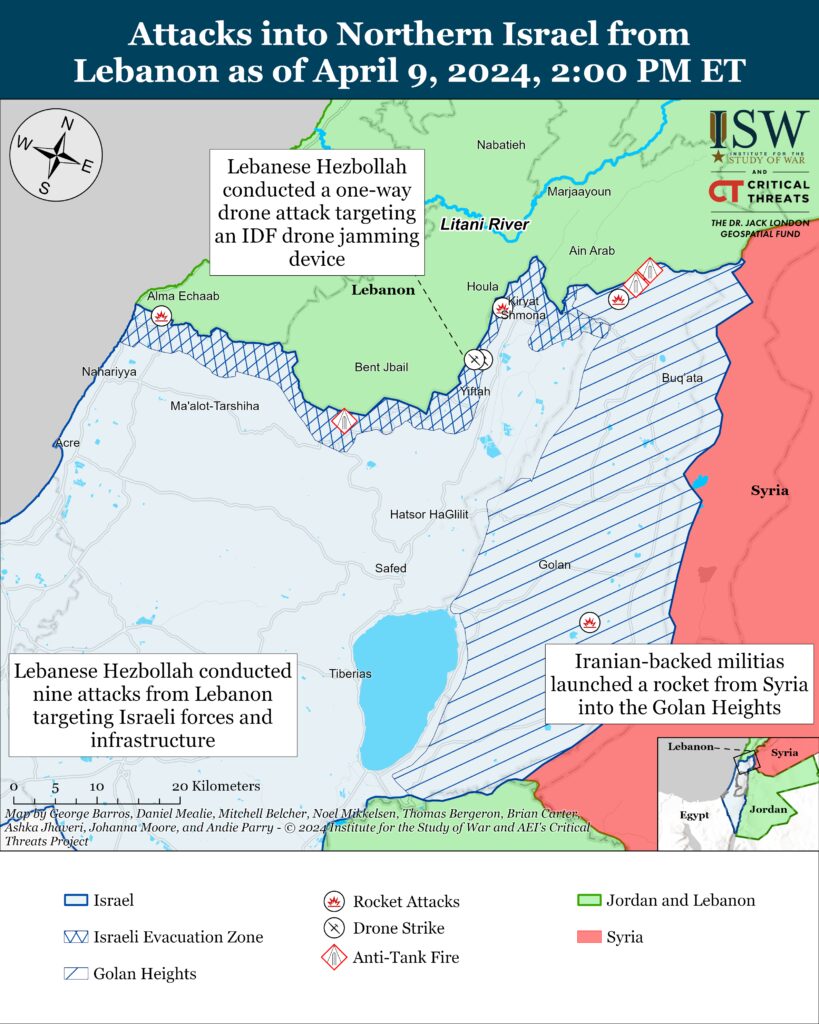
Recorded reports of attacks; CTP-ISW cannot independently verify impact.
Iran and Axis of Resistance
The Islamic Resistance in Iraq—a coalition of Iranian-backed Iraqi militias—claimed on April 8 that it conducted five attacks into Israel using “appropriate weapons” over the previous 72 hours.[li] The Islamic Resistance in Iraq claimed that its targets included the Ashkelon oil terminal and the Hatzerim airbase near Beer Sheva, among other unspecified “vital targets.” CTP-ISW cannot verify these attacks. Western analysts reported that the Islamic Resistance in Iraq used Paveh cruise missiles in most of the attacks, according to footage that the group published.[lii] The IDF intercepted a drone that entered Israeli airspace from the east and was headed toward Eilat on April 8.[liii]
US Ambassador to Iraq Alina Romanowski met with Iraqi National Security Adviser Qasim al Araji ahead of Iraqi Prime Minister Mohammad Shia al Sudani’s visit to Washington, DC, on April 15.[liv] Romanowski stated that the United States and Iraq are moving toward a “bilateral security agreement.” Iraqi officials previously stated that Sudani’s visit to Washington will focus on the status of the US-led international coalition in Iraq and the “transition to a comprehensive partnership.”[lv] Washington and Baghdad began talks to evaluate the status of the US-led international coalition in Iraq in late January 2024.[lvi] US and Iraqi officials held the latest round of Higher Military Commission talks on April 8.[lvii]
Iranian Foreign Affairs Minister Hossein Amir Abdollahian warned that the “coming days will be difficult days for Israel” during a joint press conference with his Syrian counterpart, Faisal Mekdad, on
April 8.[lviii] Abdollahian reiterated that the United States should be held responsible for the Israeli airstrike that killed several senior IRGC officers in Syria on April 1. Abdollahian emphasized that Syria is at the “frontline” of the Axis of Resistance. Abdollahian’s comments follow several senior Iranian military officials suggesting that they will carefully calibrate Iran’s response.[lix]
US CENTCOM reported that it targeted Houthi air defense systems in Houthi-controlled Yemen on April 8. CENTCOM separately intercepted a Houthi drone over the Red Sea on April 8.[lx]
CENTCOM reported that the Houthis have launched five anti-ship ballistic missiles targeting the UK-owned, Italian-operated commercial vessel MV Hope Island.[lxi]
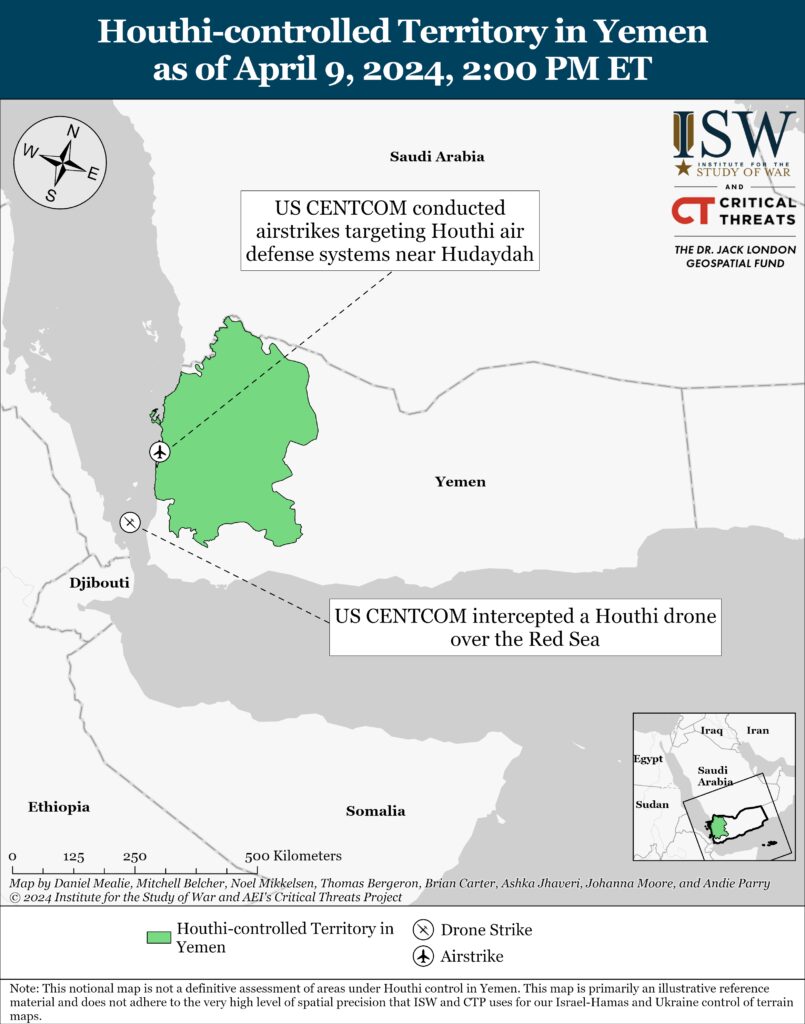
Jaish al Adl—a Baloch, Salafi-jihadi militia group—conducted an attack on April 9 killing at least five Iranian Law Enforcement Command (LEC) officers in Sib and Soran county, Sistan and Baluchistan Province.[lxii] Jaish al Adl claimed that it “completely destroyed” three LEC vehicles during the attack.[lxiii] There has been a significant uptick in anti-regime militancy in southeastern Iran since December 2023. Jaish al Adl most recently conducted a series of unprecedently complex and sophisticated attacks targeting Iranian security forces in Sistan and Baluchistan on April 4.[lxiv] The uptick in Jaish al Adl attacks, and the complexity of the April 4 attack, illustrate the increasingly precarious state of Iranian internal security, especially in Sistan and Baluchistan province.
 Eurasia Press & News
Eurasia Press & News
